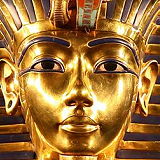
|
Tomb of Tutankhamun Kings Valley Rd, Luxor Governorate 1340420, Egypt Last Updated: 08/12/2023 |
| The Tomb of Tutankhamun, also known as the "Tutankhamun's Burial Chamber," is one of the most famous archaeological discoveries in history. It is located in the Valley of the Kings on the west bank of the Nile River near Luxor, Egypt. | |
| - Discovery: The tomb was discovered in 1922 by British archaeologist Howard Carter, under the patronage of Lord Carnarvon. The discovery of the tomb was a monumental moment in the field of Egyptology. - Tutankhamun: Tutankhamun, often referred to as King Tut, was an ancient Egyptian pharaoh of the 18th dynasty. He ascended the throne at a young age and is best known for the intact state of his tomb and the treasures it contained. - Architecture: The tomb is relatively small compared to other royal tombs in the Valley of the Kings. It consists of a descending corridor, an antechamber, a burial chamber, and a treasury room. - Treasures: The tomb's most remarkable aspect is the vast collection of treasures, artifacts, and funerary goods that were buried with Tutankhamun to accompany him in the afterlife. The collection includes furniture, jewelry, statues, chariots, and the iconic gold death mask that covered the pharaoh's mummy. - Burial Chamber: The burial chamber contained four nested sarcophagi, with the innermost one housing the mummy of Tutankhamun. The mummy was accompanied by elaborate jewelry and amulets. - Curse of the Pharaohs: The discovery of Tutankhamun's tomb was surrounded by tales of the "Curse of the Pharaohs," a supposed curse that would befall anyone who entered the tomb. This notion was largely sensationalized, and many of the original discoverers did not experience any extraordinary misfortune. - Importance: Tutankhamun's tomb is significant because it provided unprecedented insights into the funerary practices, art, and material culture of ancient Egypt during the New Kingdom period. - Restoration and Conservation: Over the years, the tomb and its treasures have undergone restoration and conservation efforts to ensure their preservation for future generations. - Visiting the Tomb: The tomb of Tutankhamun is a popular attraction for visitors to Luxor. It offers a unique opportunity to witness the artifacts and layout of an ancient Egyptian royal burial site. - Archaeological Impact: The discovery of Tutankhamun's tomb has had a lasting impact on Egyptology and the study of ancient Egypt, shaping our understanding of its history, culture, and religious practices. | |
Wikipedia
Egypt » Egy
Place » Historical Place
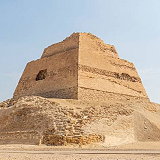
|
Maydoum Pyramid Place » Historical Place The Meidum Pyramid, located approximately 65 kilometers south of Cairo near the Faiyum region, is a significant archaeological site in Egypt. Believed to have been constructed during the transition from the 3rd to the 4th Dynasty, it is often attributed to Pharaoh Huni and later completed by Pharaoh Sneferu. 5 views 💖 1El Wasta, Beni Suef Governorate 2753212, Egypt |
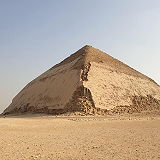
|
Bent Pyramid Place » Historical Place The Bent Pyramid is one of the pyramids built by King Sneferu, the first king of the Dynasty 4. It was called “bent” because of its broken lines due to a change of angle, an engineering issue in its design. Indeed, the pyramid construction began at an angle of 55 degrees but had to be adjusted to 43 degrees due to an overload of blocks resulting in instability. 30 views 💖 1Badrshein, Giza Governorate 3300001, Egypt |
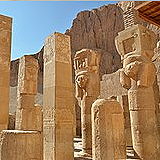
|
Mortuary Temple of Hatshepsut Place » Historical Place The Mortuary Temple of Hatshepsut is one of the most remarkable ancient monuments in Egypt, which surely you will love to visit. The temple was built to honour Queen Hatshepsut, one of the most successful pharaohs in Egyptian history. Located opposite the city of Luxor, it is considered to be a masterpiece of ancient architecture. 47 views 💖 1Al Qarna, Luxor Governorate 1340420, Egypt |
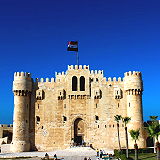
|
Qaitbay Fort Place » Historical Place Qaitbay Fort, also known as the Citadel of Qaitbay, is a historic fortress located on the Mediterranean coast in Alexandria, Egypt. Visitors to Qaitbay Fort can explore its halls, chambers, and enjoy the scenic views from its towers. The fort stands as a testament to the historical significance of Alexandria as a major Mediterranean port and the efforts to protect it through the centuries. 52 views 💖 1Alexandria Governorate, Egypt |
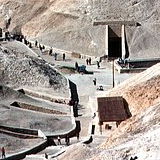
|
Valley of the Monkeys Place » Historical Place The Western Valley is an Egyptian archaeological locality situated adjacent to Luxor's Valley of the Kings and contains a number of remarkable pharaonic burials additional to the main Valley. The Western Valley is also known in Arabic as the Wadi al-Gurud (Valley of the Monkeys), on account of the representations of baboons in several tomb paintings found within the wadi. 55 views 💖 1Al Qarna Desert, Luxor Governorate 1413101, Egypt |
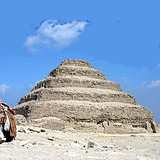
|
Saqqara Necropolis Place » Historical Place The Saqqara Necropolis is a vast ancient burial complex located in the Giza Governorate of Egypt. It is renowned for its historical significance, diverse range of tombs and structures, and the iconic Step Pyramid of Djoser. Saqqara features numerous pyramids, including the world-famous Step pyramid of Djoser,as well as a number of mastabas. Located some 30 km (19 mi) south of modern-day Cairo. 303 views 💖 1Badrshein, Giza Governorate 3352001, Egypt |
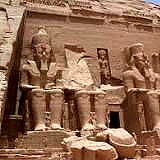
|
Abu Simbel Temples Place » Historical Place The Abu Simbel Temples are a pair of ancient Egyptian temples located near the southern border of Egypt, close to the town of Abu Simbel. These temples are renowned for their monumental size, impressive architecture, and historical significance. 480 views 💖 9Abu Simbel, Egypt |
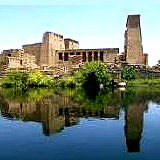
|
Philae Temple Complex Place » Historical Place The Philae Temple Complex is an ancient Egyptian temple complex located on Philae Island in the Nile River near Aswan, Egypt. It is renowned for its well-preserved temples and structures dedicated to various deities. 317 views 💖 1Aswan, Aswan Governorate, Egypt |
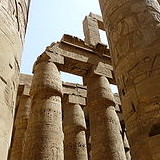
|
Karnak Place » Historical Place Karnak is a vast ancient temple complex located near Luxor in the Luxor Governorate of Egypt. It is one of the most significant and well-preserved temple complexes in Egypt, and it played a central role in ancient Egyptian religious practices and architecture. 324 views 💖 1El-Karnak, Luxor, Luxor Governorate, Egypt |
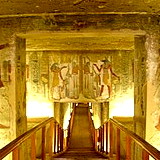
|
Valley of the Kings Place » Historical Place The Valley of the Kings is a famous archaeological site located on the west bank of the Nile in the Luxor Governorate of Egypt. It is renowned for being the burial place of many ancient Egyptian pharaohs and nobles from the New Kingdom period. 319 views 💖 1Luxor, Luxor Governorate 1340420, Egypt |
